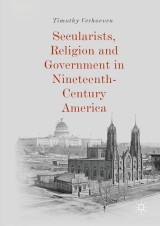Details

Secularists, Religion and Government in Nineteenth-Century America
|
96,29 € |
|
| Verlag: | Palgrave Macmillan |
| Format: | |
| Veröffentl.: | 19.12.2018 |
| ISBN/EAN: | 9783030028770 |
| Sprache: | englisch |
Dieses eBook enthält ein Wasserzeichen.
Beschreibungen
<div>This book shows how, through a series of fierce battles over Sabbath laws, legislative chaplains, Bible-reading in public schools and other flashpoints, nineteenth-century secularists mounted a powerful case for a separation of religion and government. Among their diverse ranks were religious skeptics, liberal Protestants, members of minority faiths, labor reformers and defenders of slavery. Drawing on popular petitions to Congress, a neglected historical source, the book explores how this secularist mobilization gathered energy at the grassroots level. </div><div><br></div><div>The nineteenth century is usually seen as the golden age of an informal Protestant establishment. Timothy Verhoeven demonstrates that, far from being crushed by an evangelical juggernaut, secularists harnessed a range of cultural forces—the legacy of the Revolutionary founders, hostility to Catholicism, a belief in national exceptionalism and more—to argue that the United States was not a Christian nation, branding their opponents as fanatics who threatened both democratic liberties as well as true religion. </div>
<p><br></p>
<b>Timothy Verhoeven</b> is Senior Lecturer in the School of Philosophical, Historical and International Studies at Monash University, Australia. He is the author of <i>Transatlantic Anti-Catholicism: France and the United States in the Nineteenth Century</i> (Palgrave, 2010) as well as many articles on the history of church-state relations.
<div>This book shows how, through a series of fierce battles over Sabbath laws, legislative chaplains, Bible-reading in public schools and other flashpoints, nineteenth-century secularists mounted a powerful case for a separation of religion and government. Among their diverse ranks were religious skeptics, liberal Protestants, members of minority faiths, labor reformers and defenders of slavery. Drawing on popular petitions to Congress, a neglected historical source, the book explores how this secularist mobilization gathered energy at the grassroots level. </div><div><br></div><div>The nineteenth century is usually seen as the golden age of an informal Protestant establishment. Timothy Verhoeven demonstrates that, far from being crushed by an evangelical juggernaut, secularists harnessed a range of cultural forces—the legacy of the Revolutionary founders, hostility to Catholicism, a belief in national exceptionalism and more—to argue that the United States was not a Christian nation, branding their opponents as fanatics who threatened both democratic liberties as well as true religion. </div><div><br></div>
<p>Presents a history of grassroots mobilizations in favor of a clearer division between religion and government</p><p>Explores the complex alliances between various secularist campaigners, including religious skeptics, liberal Protestants, people of minority faiths, white supremacists and labor reformers</p><p>Brings together case studies of church-state conflicts from the early Republic to the Progressive era</p><p>Appeals to scholars and students of nineteenth-century American history, religious history, legal history and modern church-state conflicts</p>
Diese Produkte könnten Sie auch interessieren:

The Last Samurai - Japanische Geschichtsdarstellung im populären Kinofilm

von: Daniel Scherrer

34,99 €















